How Preserving Heritage Can Bridge Global Divides
In an era marked by geopolitical tension, environmental crises, and deepening social inequalities, the preservation of cultural heritage might seem like a peripheral concern. Yet, as global power struggles persist and societies become increasingly fragmented, the need for soft diplomacy—rooted in shared human values and cultural understanding—has never been more critical. Cultural preservation, often viewed through the lens of local and historical significance, now holds potential as a transformative force in global diplomacy, conflict resolution, and sustainable development.
The book GRACE: Timekeepers of Ancient Cultural Legacy examines this evolving dynamic, showing how the safeguarding of cultural heritage extends beyond national boundaries. GRACE (Global Repository for Ancient Cultural Endeavours) is much more than an organization dedicated to preserving artifacts and traditions; it is an ambitious initiative that seeks to build cultural bridges and foster dialogue across the globe. The initiative’s contributions to diplomacy, ethical engagement, and environmental stewardship illustrate how cultural preservation can become a potent tool for addressing global challenges, from geopolitical conflicts to climate change.
Soft Diplomacy and the Global Influence of Culture
In the realm of international relations, hard power—the use of military force or economic sanctions—has long dominated. However, soft power, which involves influencing through attraction and persuasion rather than coercion, is increasingly being recognized for its strategic value. At the heart of soft power is culture: the shared values, symbols, and historical narratives that shape perceptions and relationships between nations.
Cultural diplomacy refers to the use of cultural interactions and exchanges as a means of promoting mutual understanding and cooperation between countries. This form of diplomacy often flies under the radar, but it plays an essential role in building trust and creating avenues for dialogue, particularly in regions where political tensions run high. GRACE positions itself as a unique player in this sphere by leveraging cultural preservation as a mechanism for fostering global solidarity.
For example, preserving the cultural sites of war-torn regions—whether ancient temples in the Middle East or traditional villages in Africa—carries profound diplomatic significance. Beyond the immediate goal of safeguarding heritage, these efforts demonstrate respect for a nation’s history and cultural identity, creating goodwill that can lay the groundwork for more formal diplomatic engagements. Cultural preservation, in this context, becomes a universal language, transcending political and ideological boundaries to foster collaboration.
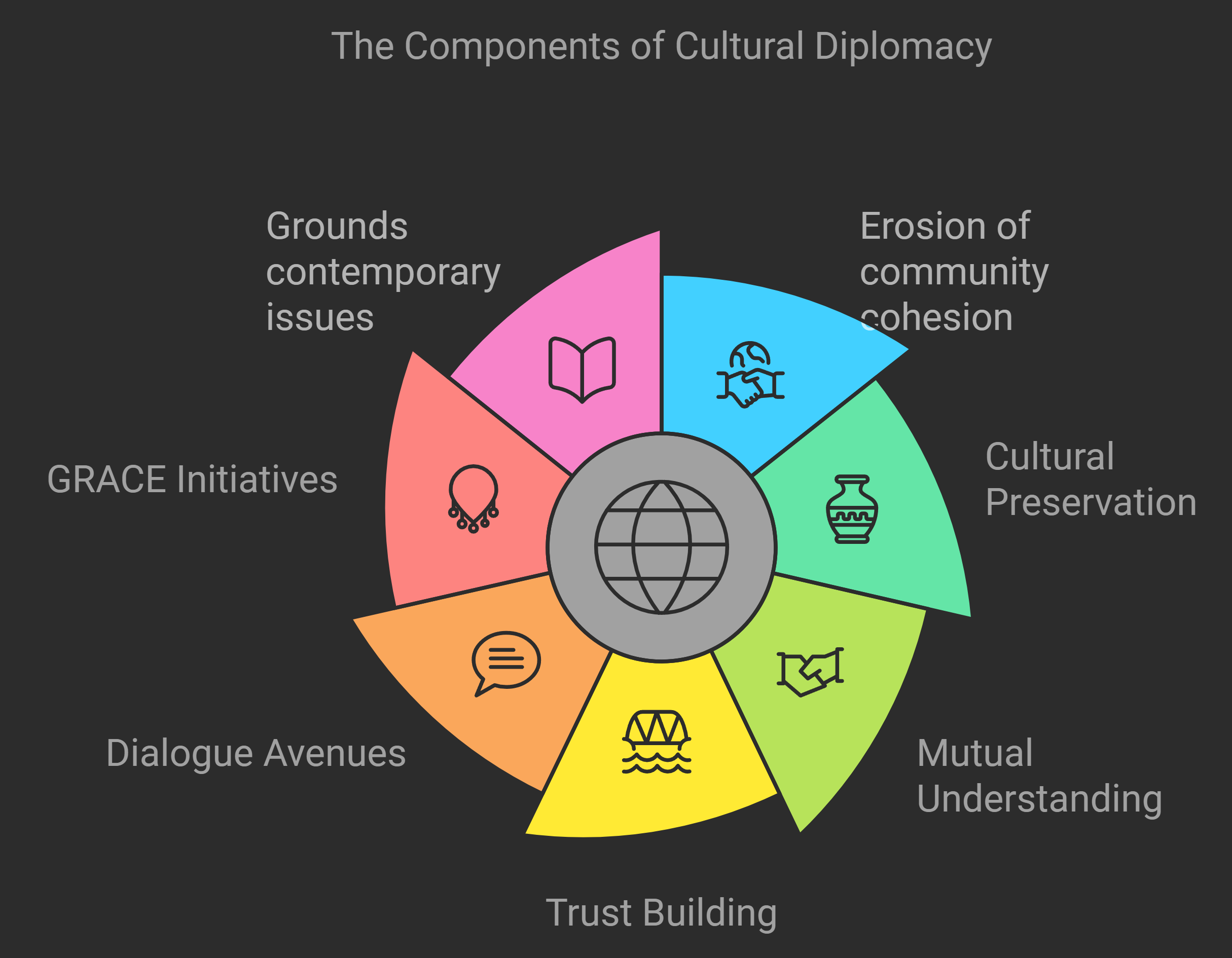
The book highlights several instances where GRACE has been instrumental in promoting dialogue between conflicting parties through cultural preservation. In one case, GRACE played a pivotal role in bringing together representatives from different ethnic groups in the Balkans, where the scars of war and division still run deep. By facilitating joint efforts to restore shared cultural landmarks, GRACE fostered reconciliation and created a platform for dialogue where political negotiations had previously failed.
Cultural Heritage as a Tool for Peacebuilding
Cultural heritage is more than a repository of the past; it is a living reflection of the values, beliefs, and stories that shape communities. In regions marked by conflict, the destruction of cultural sites is often a deliberate strategy to erase collective memory and weaken the identity of a people. Rebuilding and preserving cultural heritage in such contexts can serve as an act of resistance against efforts to sow division and discord. Moreover, it can play a vital role in peacebuilding, fostering a sense of shared history and common purpose. The organization through its volunteer organizations has been deeply involved in efforts to document and restore cultural heritage that was damaged or destroyed during the civil war. Working with local communities, GRACE has helped salvage cultural artifacts and architectural treasures, ensuring that future generations will have access to their shared heritage.
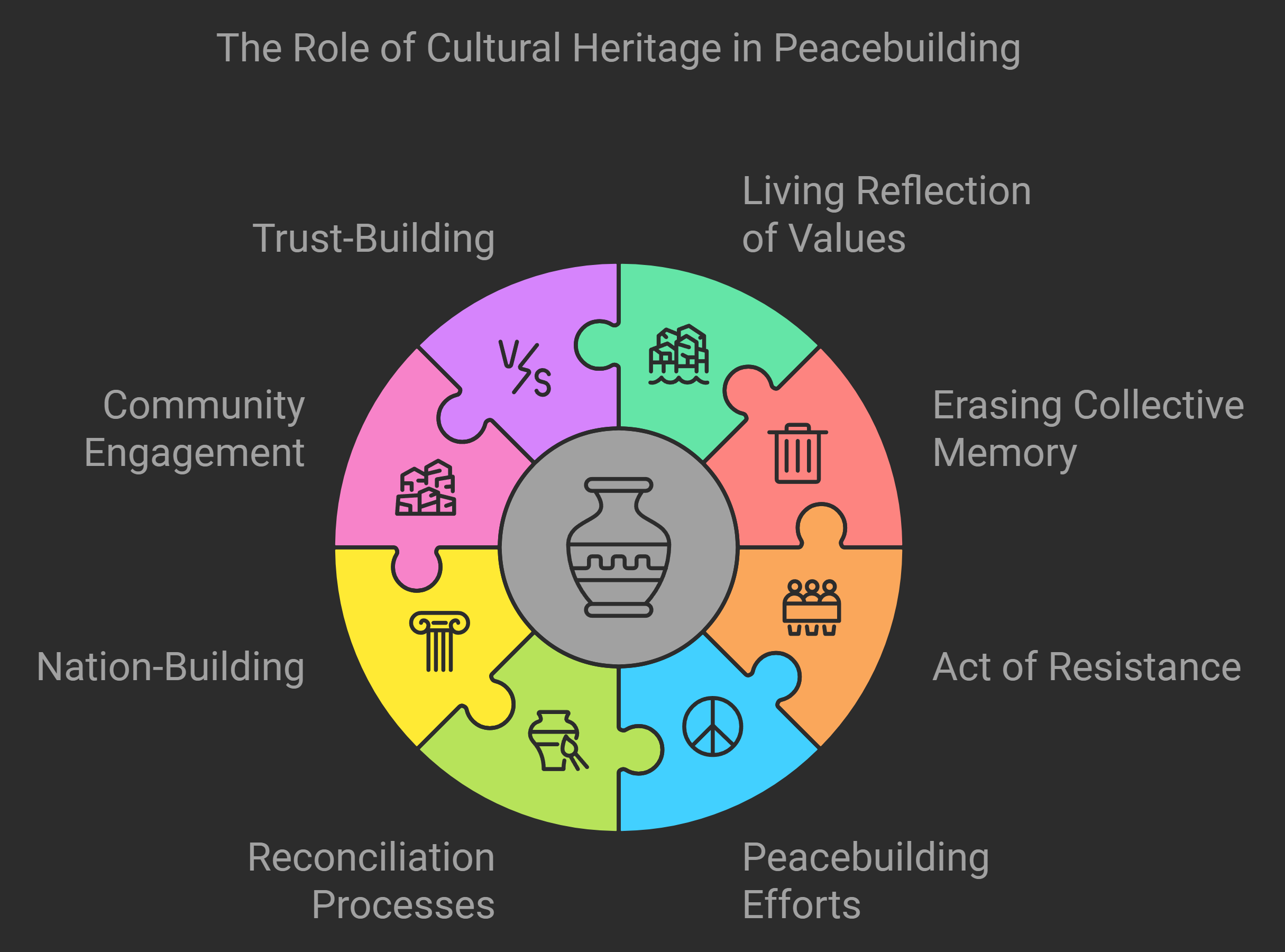
Such efforts also help rebuild trust between warring factions. In Syria, for instance, the restoration of a shared cultural site became a focal point for dialogue between previously opposed groups. By engaging in a project that held cultural significance for both sides, GRACE through its volunteer organizations facilitated the rebuilding of social ties that had been shattered by years of conflict. The restoration of heritage thus becomes a catalyst for social healing, demonstrating that cultural preservation is not merely a passive act but an active tool for creating peace.
The restoration of cultural heritage after conflict is not merely symbolic. It has tangible effects on reconciliation processes and nation-building efforts. By restoring cultural sites, communities can reclaim their narratives, rebuild their identities, and recover from the trauma of war. GRACE’s work in Syria exemplifies this.
Addressing Ethical Challenges in Global Heritage Preservation
The internationalization of cultural preservation efforts raises critical ethical questions about ownership, representation, and power dynamics. Historically, the preservation and display of cultural artifacts have often been shaped by unequal power relations, particularly in the context of colonialism. Many of the world’s most renowned museums are filled with artifacts that were acquired during colonial conquests, raising concerns about the exploitation and misrepresentation of cultures.
Question of restitution
One of the most contentious issues in cultural preservation today is the question of restitution: Should artifacts taken during periods of colonization be returned to their countries of origin? This debate has intensified in recent years, with countries such as Greece, Nigeria, and Egypt demanding the return of cultural treasures that were taken and are now housed in Western museums. GRACE advocates for an ethical framework that prioritizes the rights of communities and nations to reclaim their cultural heritage.
However, the process of restitution is complex and fraught with challenges. There are legal barriers, logistical difficulties, and differing interpretations of cultural ownership. GRACE emphasizes the need for international cooperation and dialogue to navigate these challenges. The organization has been involved in several high-profile restitution cases, working with governments, museums, and indigenous communities to facilitate the return of artifacts to their rightful owners.
Beyond restitution, GRACE’s work raises broader questions about the ethical responsibility of cultural preservation organizations. Who gets to decide which cultures are preserved and how they are represented? How can we ensure that preservation efforts are not driven by external agendas but are instead grounded in the needs and desires of the communities whose heritage is at stake? GRACE advocates for a rights-based approach to cultural preservation, one that centers the voices of local communities and ensures that they have agency over their cultural narratives.
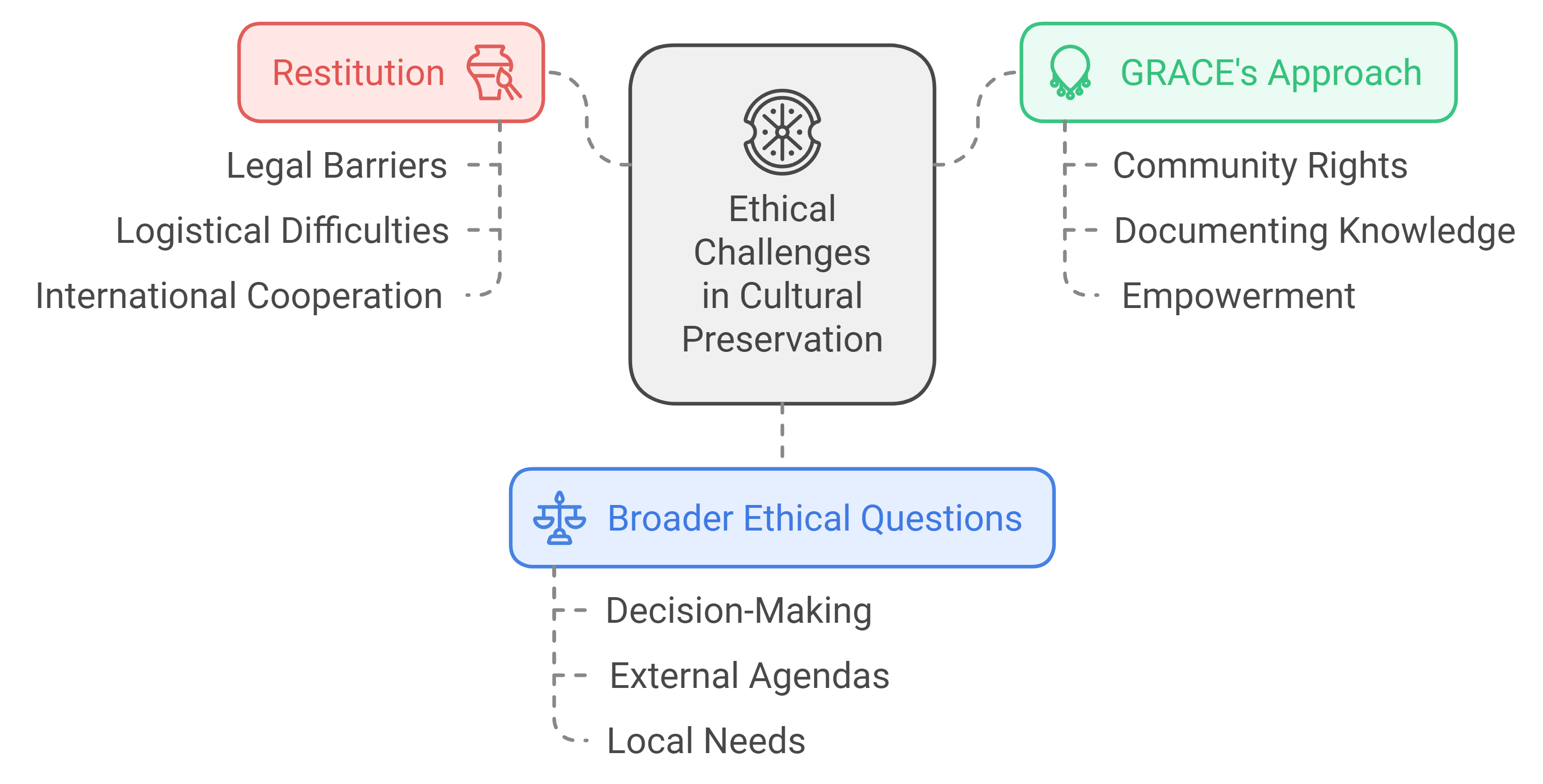
The organization’s work in Africa provides a powerful example of this approach in action. In several regions, GRACE has partnered with indigenous communities to document and revitalize traditional knowledge systems that are at risk of disappearing due to modernization and climate change. These efforts have not only helped preserve cultural practices but have also empowered communities to advocate for their rights and protect their land from exploitation.
Climate Change and the Threat to Cultural Heritage
The environmental challenges posed by climate change add another layer of complexity to the preservation of cultural heritage. Rising sea levels, extreme weather events, and environmental degradation threaten many of the world’s most cherished cultural sites. Coastal communities, in particular, are at risk of losing both their homes and their cultural heritage as climate change accelerates.
GRACE has been at the forefront of efforts to develop climate-responsive cultural preservation strategies. The organization has worked in partnership with environmental scientists, policymakers, and local communities to assess the risks posed by climate change to cultural heritage and to develop adaptive measures. For example, in the Pacific Islands, GRACE has collaborated with local leaders to create a comprehensive plan for safeguarding cultural sites that are vulnerable to rising sea levels. This plan includes the documentation of at-risk sites, the development of protective infrastructure, and the relocation of cultural practices to safer areas.
Incorporating cultural preservation into climate adaptation strategies is crucial for several reasons. First, cultural heritage can play a role in strengthening community resilience to climate change. Traditional knowledge systems, often developed in response to local environmental conditions, offer valuable insights into sustainable land management and resource use. By preserving and revitalizing these systems, communities can draw on ancestral wisdom to adapt to changing environmental conditions.
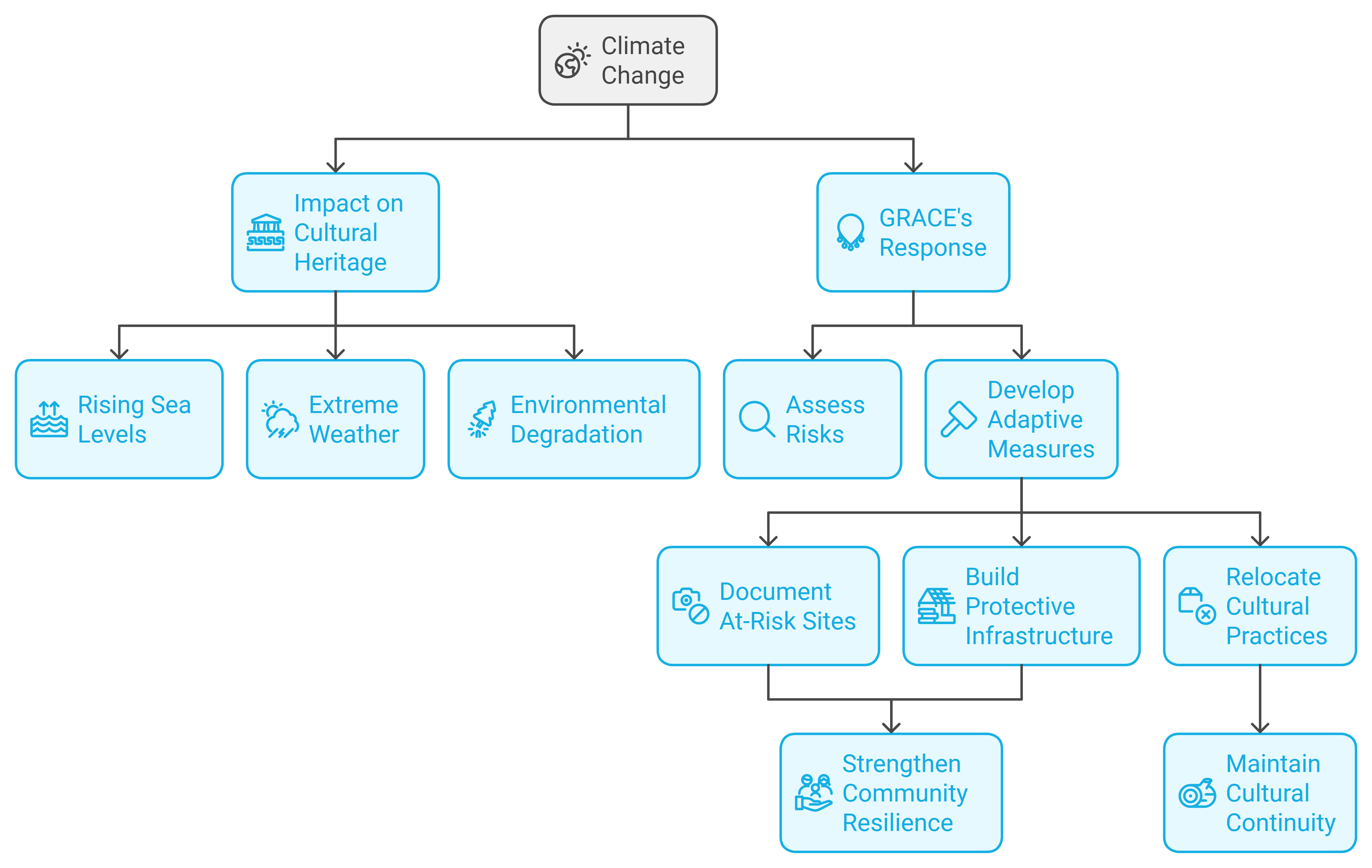
Second, cultural heritage provides a sense of continuity and belonging that is particularly important in times of crisis. For communities facing displacement due to climate change, maintaining cultural practices can help mitigate the trauma of losing their homes and livelihoods. GRACE’s work in the Pacific Islands illustrates how cultural preservation can be integrated into climate resilience efforts, ensuring that communities not only survive but also retain their cultural identity in the face of environmental upheaval.
The Role of International Organizations and Policy in Cultural Preservation
International organizations such as UNESCO have long played a central role in promoting cultural preservation on a global scale. UNESCO’s World Heritage program, for instance, designates and protects cultural and natural sites of outstanding universal value. However, as the threats to cultural heritage evolve, so too must the policies and frameworks that guide preservation efforts.
GRACE advocates for a more expansive and inclusive approach to cultural preservation, one that goes beyond the protection of monumental sites and considers the needs of local communities and marginalized groups. The organization has called for the adoption of international policies that prioritize community-led preservation efforts and that recognize the interconnectedness of cultural heritage, human rights, and sustainable development.
One of the key challenges in international cultural preservation is ensuring that efforts are not driven by external interests. Too often, preservation projects are initiated and funded by external organizations or governments with little input from the communities whose heritage is at stake. This can result in the commodification of cultural heritage, where traditions and practices are preserved primarily for tourism or economic gain rather than for the benefit of the communities themselves.
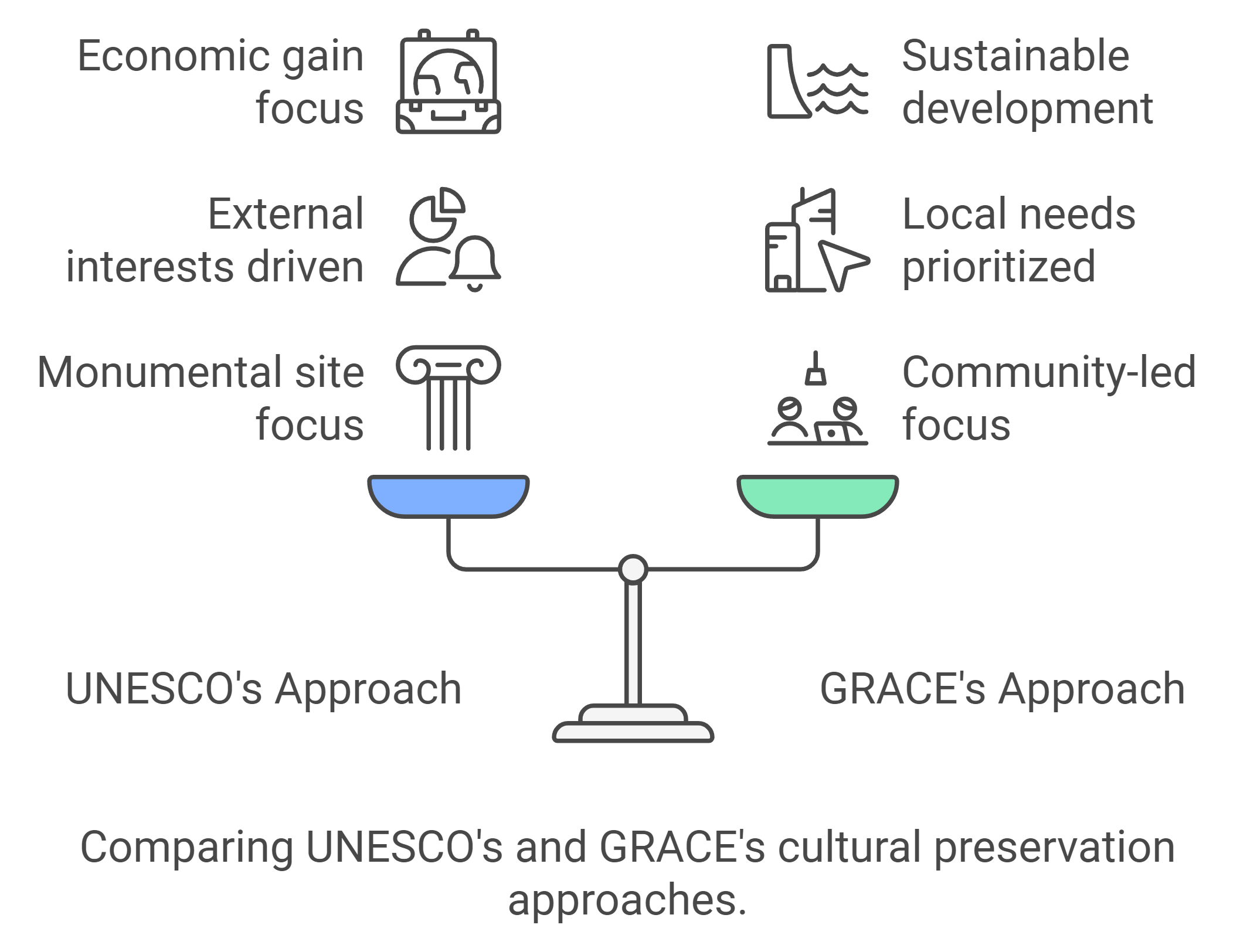
GRACE’s work seeks to address this challenge by promoting a participatory approach to cultural preservation. The organization works directly with local communities to document and revitalize their cultural practices, ensuring that preservation efforts are aligned with their needs and priorities. This approach has been particularly effective in indigenous communities, where cultural preservation is often linked to broader struggles for land rights and environmental protection.
Cultural Preservation and Global Solidarity
In a world that is increasingly polarized, cultural preservation offers a path toward greater solidarity and understanding between nations and communities. By protecting the cultural heritage of diverse groups, we acknowledge the value of their contributions to human civilization and promote a more inclusive global narrative.
Cultural diplomacy—the use of cultural exchange to build relationships and foster mutual understanding—has a critical role to play in addressing some of the world’s most pressing challenges. In regions where political and military interventions have failed, cultural diplomacy offers an alternative approach that prioritizes dialogue and cooperation over confrontation. GRACE’s work exemplifies the potential of cultural diplomacy to bridge divides and create avenues for collaboration, even in the most challenging of contexts.
By emphasizing the universal value of cultural heritage, GRACE encourages nations to look beyond their differences and work together to protect our shared human legacy. The organization’s efforts to promote cultural preservation in conflict zones, address ethical challenges in restitution, and develop climate-responsive strategies underscore the vital role that cultural heritage can play in building a more just and sustainable world.
In the face of global challenges, the preservation of cultural heritage offers a powerful reminder of our shared humanity. It is a call to recognize the interconnections between the past, present, and future, and to work together to protect the cultural legacies that define us all. Through initiatives like GRACE, cultural preservation becomes more than an act of remembrance—it becomes a tool for diplomacy, peacebuilding, and global solidarity.
